
Being a director of photography is not just about having an eye for composition and understanding light. There are many other skills a DP needs. Today I’ll discuss what some of those are, in my opinion, and in the opinions of some top Hollywood DPs.
“Obviously you have to know what you are doing, have an eye for photography, and know about film and composition. But it’s a team effort.” – Adrian Biddle (Aliens, Event Horizon)
Shane Hurlbut (Need for Speed, Terminator: Salvation) says that 33% of a cinematographer’s job is managing their crew. You need to pick great people to work with, nurture them, share your knowledge with them, and trust them to deliver the goods.
Frankie DeMarco (Mad Men, All is Lost) advises trying to think like an editor: what specific shots do you need to tell the story? Editing is one of the areas it’s most useful to have experience of, as a DP. Knowing whether what you’re shooting will cut together is vitally important. I often find myself suggesting to a director that we run a scene from a little earlier, have someone come into shot at the start, or cut it later so they exit shot, knowing how useful that stuff can be in post.
Understanding the jobs of other departments is very useful. The more you know about production design, costume and make-up, the better you can light it. The more you know about acting, the better you can appreciate the impact your decisions – equipment placement, the strictness of adherence to marks you demand, the lenses and angles you select – have on an actor’s work. This doesn’t mean that you have to do all these jobs at some point, but try reading the occasional book or watching the odd YouTube video about the subject, or better still, forge great relationships with other heads of departments and pick their brains.

There are of course many rules to cinematography – the line of action, Golden Thirds, lighting the downside – but how many of them do you need to know?
“To any aspiring cinematographer, I’d say learn the rules before you try and bend or break them. You need a foundation on which to build.” – Douglas Slocombe (Indiana Jones trilogy)
You should take every opportunity to learn; read every blog, every book that you can, go to workshops, to masterclasses; watch behind-the-scenes videos. The more knowledge you have to fall back on in a crisis, the better.
“You always try to create a certain style for each film but there are times when you have to make it up as you go along.” – Jan de Bont (Die Hard, Flatliners)
Flexibility is key. You have to do what’s right for the scene, what’s right for the set and the talent, what the director wants, and what works for the schedule. Sometimes this means changing tack at the last minute. You can’t throw a hissy fit and weep for the lighting set-up you’d imagined; you have to get on with it. Corporate videos, in which you often have to sacrifice your photographic ideals for the mundane needs of the client, are great training for this.
You have to be a storyteller; all heads of department have to be. As DP, your tools for telling the story are lights and lenses. You need to absorb the script, appreciate the narrative beats and come up with creative ways to accent those beats using your tools.
Perhaps the most important thing to have is life experience.
“It’s my personal interpretation of a script that allows me to create the visuals. That interpretation is based on my own life experiences, aesthetics, education, and knowledge, all of which help to shape my understanding of a story.” – Janusz Kaminski (Saving Private Ryan, Lincoln)
Thanks to Stephen Murphy and his DOP Documents for the block quotes.
